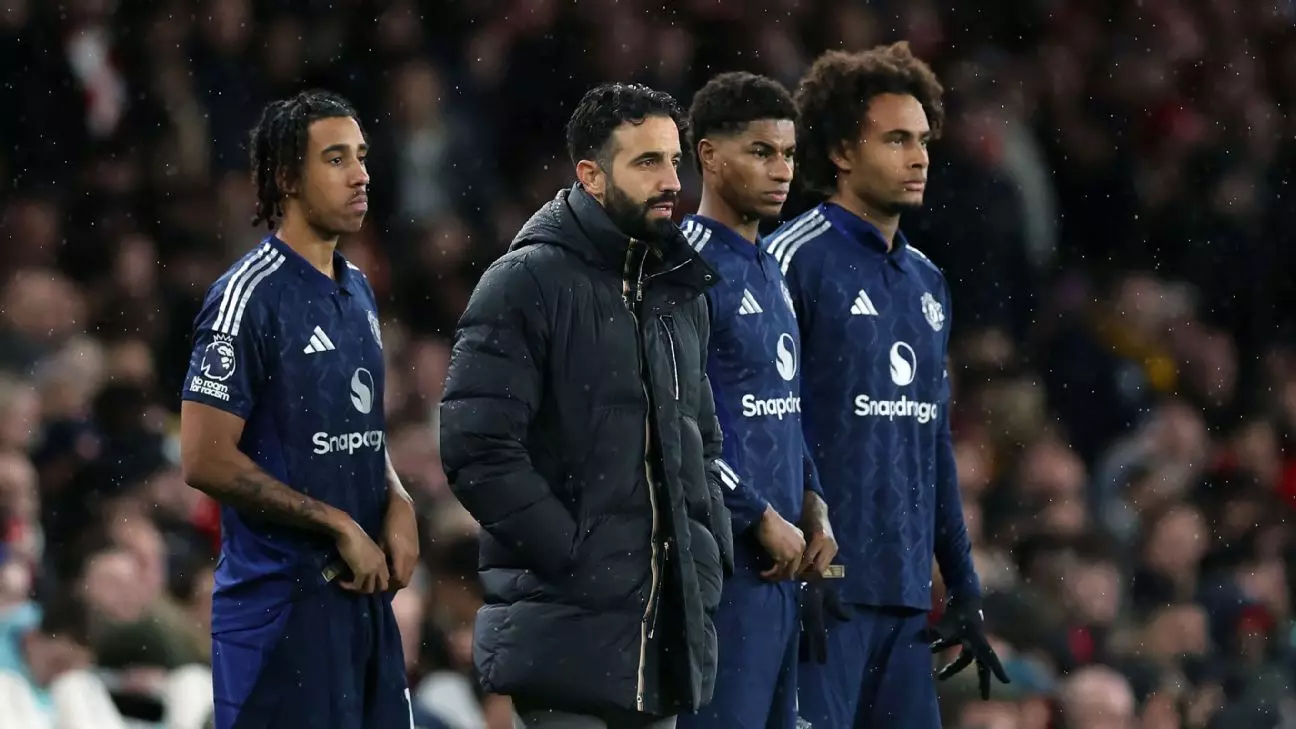In the world of football management, few things can be as disconcerting as the moment a manager sees their carefully laid plans crumble. For Ruben Amorim, the new head coach at Manchester United, this became all too real following a disappointing 2-0 defeat against Arsenal, marking his first loss since taking over the reins. The match served as a stark reminder of the hurdles he faces, particularly with an injury-stricken squad struggling to find its rhythm.
One cannot overlook the impact of injuries on a football team’s performance. Amorim’s lament regarding “time limits” for player returns brings to light the complex dynamics of managing a squad that’s not only dealing with fitness concerns but is also in dire need of clinical performances. The loss saw key players such as Harry Maguire, Tyrell Malacia, and Mason Mount limited to under an hour of play. This reflects a broader issue: can a manager effectively implement their tactical vision when the main actors in the play are sidelined or not fully fit?
Amorim’s proactive approach in handling these fitness issues, including his decision to rotate players and understand their limitations, speaks volumes about his analytical mindset. However, it also raises questions about the long-term sustainability of this strategy. Will continually managing players with “time limits” hinder the team’s development? Or can it serve as a catalyst for fostering depth within the squad?
Despite the loss at Arsenal, Amorim demonstrated resilience and a capacity to analyze his team’s performance critically. His insistence on extracting positives, even from a negative outcome, demonstrates a coaching philosophy deeply rooted in continuous improvement. This perspective is crucial in high-pressure environments where results are paramount. Amorim noted that players struggled to control the game’s tempo but also recognized moments in the match where they could have seized momentum.
This ability to identify areas for growth rather than solely focusing on the scoreboard could be pivotal in establishing a resilient mentality within the squad. Such an approach invites players to view setbacks as learning opportunities rather than failures. Amorim’s capacity to assess the game beyond mere numbers is indicative of an emerging leader who can inspire confidence, even when facing adversity.
The road to recovery for Manchester United under Amorim may be fraught with challenges, but it also presents opportunities for the manager to showcase his ability to develop talent. Recent performances indicate that players are beginning to grasp the tactical requirements Amorim is instilling. The inclusion of Leny Yoro, returning from a foot injury, illustrates a commitment to integrating fresh talent while managing risk effectively.
Moreover, the case of Luke Shaw serves as a focal point for Amorim’s philosophy of player health and management. Shaw’s struggles with injuries could easily derail a weaker managerial approach, but Amorim’s commitment to ensuring he takes the necessary time to recover is a testament to his understanding of player welfare. It underpins his strategy of prioritizing long-term gains over immediate results.
Every manager embarks on their journey with a unique set of challenges and expectations. For Ruben Amorim, the early setbacks and injury crises present an opportunity for reflection, adaptation, and growth. His ability to juggle player fitness with tactical needs will ultimately shape his tenure at Manchester United. As he lays the groundwork for a new era, Amorim’s keen analytical skills and commitment to player development will play a crucial role in reversing the club’s fortunes.
In this fluid landscape, Amorim’s journey serves as a reminder that while the pressures of football are immense, the ability to remain adaptable and forward-thinking can pave the way for future success. For Manchester United, the hope lies in Amorim’s vision and determination to forge a stronger, more resilient squad capable of competing at the highest level.


Leave a Reply